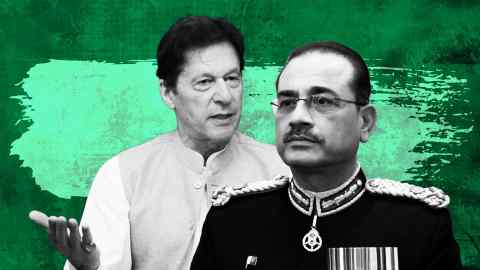
Imran Khan is fighting for his political survival after Pakistani authorities launched a crackdown on his party, with the popular former prime minister acknowledging his path back to power is narrowing.
Since being ousted in a no-confidence vote last year, Khan has waged a relentless campaign to force an election, mobilizing supporters across the country and defying Pakistan’s powerful military, which he accuses of orchestrating his ouster. a way that few others have dared.
This high-stakes campaign now appears to have failed. In recent weeks, authorities have detained thousands of his supporters and dozens of senior leaders have left his Pakistan Tehreek-e-Insaf party under pressure. The 70-year-old former cricketer, who is out on bail after being arrested last month, is battling dozens of other cases ranging from terrorism to allegations of murder.
“Right now it’s a matter of survival,” he told the Financial Times in an interview from his home in Lahore. “To put it in cricket terms, when you lose early wickets, you just put your head up and stay at the crease. Don’t play any extravagant shots now. All we can do is survive this unprecedented crackdown.”
“Any supporter, our entire management [are] in prison, the rest are in hiding,” he continued. “So at the moment I’m pretty isolated, because I can’t get in touch with anyone.”
Khan blamed the campaign on the country’s military, which has long controlled Pakistani politics from behind the scenes, calling it “undeclared martial law” and claiming it was more popular than ever. Although national elections are due in October, analysts say the polls could be delayed due to economic and political turmoil.
“They will only hold elections when they think my party is crushed. And that is what is happening now,” Khan said. “If there are elections we would win.”
To his opponents, Khan is less a principled defender of democracy than a power-hungry opportunist and populist. Pakistan’s famous former cricket captain rose to the top job in 2018 thanks in part to the support of the military, only for the relationship to sour while in office.
His military-backed government was often accused of using its own heavy-handed tactics to quell dissent, including arresting rival leaders on corruption charges.
Once ousted amid accusations that he mismanaged the economy, Khan criticized not only Prime Minister Shehbaz Sharif, whom he blames for Pakistan’s current economic crisis, but the military, even accusing an officer military of conspiring in an assassination attempt against him last year.
The Sharif government “realizes that without the support of the military establishment they are gone,” Khan said. “In fact, they agree to this undeclared martial law because they are afraid of the election.”
The crackdown began after Khan was arrested on corruption charges in early May, sparking a wave of sometimes violent protests and vandalism of some military installations by PTI supporters. Khan denies the allegations.
Thousands of supporters were arrested and several prominent PTI leaders, including former ministers Shireen Mazari and Fawad Chaudhry, resigned after being repeatedly arrested.
Several former PTI leaders said their ordeal ended only after they agreed to distance themselves from Khan. “I doubt if people will forgive Shehbaz Sharif and his government,” said one of them. “It is not clear who will lead Pakistan in the future. Right now, the government is unpopular and it is difficult to know whether they will succeed.”
Media executives also said they were ordered to reduce coverage of the former prime minister. “Imran Khan has disappeared from television screens,” said the head of a major Pakistani news organization. “We cannot use his name or that of his party.”
The UN human rights commissioner and others have condemned the current crackdown. Pakistan’s military did not respond to a request for comment, but has previously rejected criticism of its actions, including plans to try suspected vandals in military courts.
“It’s about time [the] The noose of law is also being tightened around the planners and masterminds” of what it called a “politically driven insurgency against the state,” the army said this month.
recommended
Some PTI exiles led by former general secretary Jahangir Tareen have since formed a rival party, the Istehkam-e-Pakistan party.
Bilal Gilani, executive director of pollster Gallup Pakistan, said the military may be tacitly encouraging rivals like these to weaken the PTI’s support. He added that the crackdown had damaged Khan’s standing among army loyalists.
“Among the chattering classes, the perception is that the PTI is finished,” Gilani said. Khan “could lose a lot of political power despite being very popular.”
The Sharif government has dismissed Khan as a passing fad.
“Imran Khan’s rise was mainly due to his social media presence,” said Qaiser Ahmed Sheikh, a member of parliament from Sharif’s Pakistan Muslim League-Nawaz party. “Once its popularity is over, many grassroots people will look for an alternative. The PTI only had a very short-term existence.”
However, analysts have warned that the prospects of Khan’s comeback will not be written off. He also argued that attempts to stifle him were “unsustainable”.
The crackdown “is completely against the culture of this country,” he said. “And so there’s a big backlash as well. . . . We just have to weather the storm. I don’t think this can last.”
[ad_2]
Source link





